Frontpage News (3259)
Kidney transplants: Private hospitals can help check medical tourism
Written by Super User Private hospitals are leading state-run facilities in the race to make Nigeria a hub of kidney transplants and reduce the number of patients going abroad for the procedure, a urologist, Dr Olusola Ajamu has said.
Private hospitals are leading state-run facilities in the race to make Nigeria a hub of kidney transplants and reduce the number of patients going abroad for the procedure, a urologist, Dr Olusola Ajamu has said.
He said a little government support could increase access to transplants in a matter of months. A team of local and foreign doctors completed four kidney transplants at Abuja-based Zenith Hospital last week, the second after two previous transplants in May.
“We have few government hospitals in Nigeria who have done some surgeries, like University College Hospital, Ibadan and Obafemi Awolowo University Teaching Hospital, Ife, but it is only private hospitals that are championing kidney transplants,” Ajamu told Daily Trust health desk. Ajamu was among four local experts who took part in the surgeries, and two more will hold in October.
An increasing number of private hospitals in Lagos and Abuja have since last year successfully done kidney transplants at costs lower than charges in India, where up to 5,000 Nigerians travel every month for medical care, costing Nigeria up to N78 billion annually, according to some reports. Olusola said more Nigerians with chronic kidney disease are becoming aware they need dialysis or transplant but the development of kidney transplant is at a stage where it is still capital intensive.
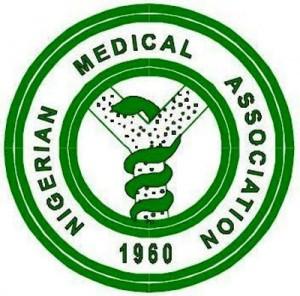 Nigeria loses a sum of N250 billion annually to medical tourism, the Nigeria Medical Association(NMA) has said. To put an end to such capital flight, the NMA recommended the upgrading of the country’s tertiary institutions and replacing their obsolete equipment with modern ones. In a communiqué at the end of its national executive council (NEC) meeting in Ilorin, Kwara state ,the association said it was opposed to giving girls out in marriage before the age of 18. The communiqué was jointly signed by NMA President and Secretary General, Dr Kayode Obembe and Dr Adewunmi Alayaki.
Nigeria loses a sum of N250 billion annually to medical tourism, the Nigeria Medical Association(NMA) has said. To put an end to such capital flight, the NMA recommended the upgrading of the country’s tertiary institutions and replacing their obsolete equipment with modern ones. In a communiqué at the end of its national executive council (NEC) meeting in Ilorin, Kwara state ,the association said it was opposed to giving girls out in marriage before the age of 18. The communiqué was jointly signed by NMA President and Secretary General, Dr Kayode Obembe and Dr Adewunmi Alayaki.
Reading the communiqué, Dr Obembe urged President Muhammadu Buhari to appoint a medical doctor as the minister of health, adding that “doctors who take care of the sick must be accorded priority in the scheme of things.” Part of the communiqué reads: “NMA has been clamouring for the post of Surgeon General which is paramount in our health system. Examples we can point to are: Attorney General of the Federation, Accountant General of the Federation and Surveyor General and Auditor General.
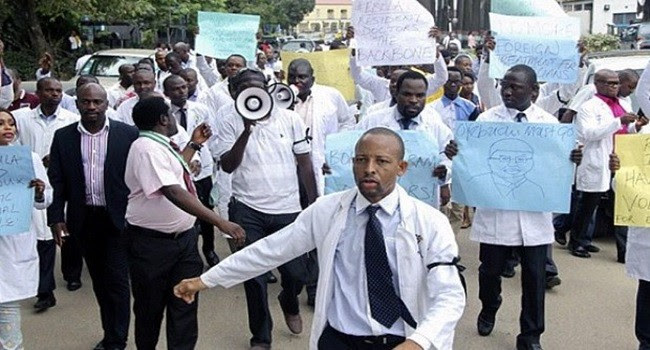 No part of public service in Nigeria has experienced more strikes than the health sector. Right now, public tertiary hospitals in Nigeria are struggling to get back to life after another series of strikes. The University College Hospital, Ibadan, was crippled for 108 days by a strike called by the Association of Resident Doctors. At LAUTECH Oshogbo, a strike closed the hospital for 5 months, and in the Psychiatric Hospital in Yaba, doctors walked away from their duty posts leaving their patients to their own means. The story of the Federal Medical Centre in Owerri is already legendary, as health workers came to “work” every day but spent their time singing and praying on the hospital grounds, while ignoring their patients in the wards, protesting against the privatisation of some of the hospitals services. Their strike lasted for three months.
No part of public service in Nigeria has experienced more strikes than the health sector. Right now, public tertiary hospitals in Nigeria are struggling to get back to life after another series of strikes. The University College Hospital, Ibadan, was crippled for 108 days by a strike called by the Association of Resident Doctors. At LAUTECH Oshogbo, a strike closed the hospital for 5 months, and in the Psychiatric Hospital in Yaba, doctors walked away from their duty posts leaving their patients to their own means. The story of the Federal Medical Centre in Owerri is already legendary, as health workers came to “work” every day but spent their time singing and praying on the hospital grounds, while ignoring their patients in the wards, protesting against the privatisation of some of the hospitals services. Their strike lasted for three months.
This story map details the major health sector strikes in 2015. Last year, many public sector hospitals across the country were closed for about half of the year following strikes as doctors refused to return to work, even during the Ebola outbreak. Almost as soon as they returned, other health sector workers under the aegis of the Joint Health Sector Unions (JOHESU) proceeded to strike from November 2014 to February 2015. When there are strikes in public sector hospitals, there are only two constituencies that suffer: a) the patients, and b) the tax-payer (i.e. you and I), who do not get a service that is paid for on our behalf by government.
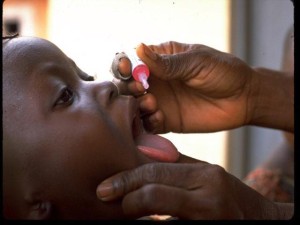 President Muhammadu Buhari yesterday restated his resolve to ensure that Nigeria is finally certified polio-free by 2017, saying all Nigerians must join hands with the federal government to achieve this .Buhari said this at separate meetings with governors of polio-vulnerable states and members of the High-Level Advocacy Group. The president noted that for the country to become polio-free permanently, it must build on its achievement of being polio-free for 12 months, which was marked in July. Senior special assistant to the president on media and publicity, Mallam Garba Shehu, quoted Buhari as saying he had initiated the meetings with the governors and Advocacy Group members because the country could not afford a reversal of what had been achieved after 17 years of the polio eradication programme in Nigeria.
President Muhammadu Buhari yesterday restated his resolve to ensure that Nigeria is finally certified polio-free by 2017, saying all Nigerians must join hands with the federal government to achieve this .Buhari said this at separate meetings with governors of polio-vulnerable states and members of the High-Level Advocacy Group. The president noted that for the country to become polio-free permanently, it must build on its achievement of being polio-free for 12 months, which was marked in July. Senior special assistant to the president on media and publicity, Mallam Garba Shehu, quoted Buhari as saying he had initiated the meetings with the governors and Advocacy Group members because the country could not afford a reversal of what had been achieved after 17 years of the polio eradication programme in Nigeria.
The president said: “I want to reaffirm the commitment of the federal government to sustain the gains and momentum to enable Nigeria achieve certification by 2017. “I am, therefore, inviting you to join me in actualizing this pledge as experts have cautioned that the progress we have made in the polio eradication efforts is still very fragile and that there is the risk of gains reversal if we don’t sustain this great effort and allow complacency to set in.“As you are aware, the fact that we have not had any case of polio for over a year now does not mean that we are polio-free; it is just one of the milestones on the path to being polio-free.
Exhibition: Medic West Africa to enhance healthcare education in the region
 The 4th edition of Medic West Africa Exhibition and Congress (MWA),organised by Informa Life Sciences Exhibitions, will take place on 14-16 October 2015 at the Eko International Convention & Exhibition Center, Lagos, Nigeria. The event boasts a strong healthcare education programme as well as CPD accredited master classes taught by some of the key healthcare companies in the industry. “Medic West Africa is primarily concerned with providing accredited medical education to healthcare professionals who are interested in updating and furthering their clinical knowledge and skills,".
The 4th edition of Medic West Africa Exhibition and Congress (MWA),organised by Informa Life Sciences Exhibitions, will take place on 14-16 October 2015 at the Eko International Convention & Exhibition Center, Lagos, Nigeria. The event boasts a strong healthcare education programme as well as CPD accredited master classes taught by some of the key healthcare companies in the industry. “Medic West Africa is primarily concerned with providing accredited medical education to healthcare professionals who are interested in updating and furthering their clinical knowledge and skills,".
Jamie Hill, Director, Informa Life Sciences Group, Africa, said, adding that "by ensuring that our conferences are accredited and our speakers are leading experts in their fields, MWA is committed to providing the best possible medical education available within Nigeria and West Africa." This year's main conference themes are quality, diabetes care, cardio-renal disease, healthcare financing and social media in healthcare. The conferences are offered in partnership with Beyhealth, and in association with the Healthcare Federation of Nigeria. “We are introducing the interactive social media workshop hosting experts from both a social media background and a healthcare background, to discuss the importance of social media in advancing healthcare in West Africa,” adds Mr. Hill.
 Another fake doctor, a female, Nwosu Angela Njide, has been arrested by the Medical and Dental Council of Nigeria (MDCN) and handed over to the police. The Head of Department of the Inspectorate Unit of the MDCN, Dr Henry Okwuokenye, who carried out the arrest, told LEADERSHIP that the council has been on the trail of the impostor for more than a year now as she has been evading arrest. He said the fake doctor who is in her 30s had confessed to have worked in different places, including the British American Tobacco (BAT) clinic, Ibadan, the Lagos State University Teaching Hospital (LASUTH) and eventually in Rauz hospital, Apo in Abuja before nemesis caught up with her.
Another fake doctor, a female, Nwosu Angela Njide, has been arrested by the Medical and Dental Council of Nigeria (MDCN) and handed over to the police. The Head of Department of the Inspectorate Unit of the MDCN, Dr Henry Okwuokenye, who carried out the arrest, told LEADERSHIP that the council has been on the trail of the impostor for more than a year now as she has been evading arrest. He said the fake doctor who is in her 30s had confessed to have worked in different places, including the British American Tobacco (BAT) clinic, Ibadan, the Lagos State University Teaching Hospital (LASUTH) and eventually in Rauz hospital, Apo in Abuja before nemesis caught up with her.
Okwuokenye narrated that the fake doctor’s ordeal began more than a year ago when she went to Oyo State to register for her license to practice at the Ministry of Health under the Oyo State Director, Medical Services. However, luck seemed to have ran out on her as the officials of the ministry became suspicious of her qualifications and went to the MDCN to verify the authenticity of her claims. Nwosu claimed to have graduated from medical school 2005 at University of Nigeria, Nsukka.and did housemanship at UNN’s teaching hospital, but she failed simple questions any medical student is expected to know. Following the refusal of the Oyo State Ministry of Health to register her, she was said to have relocated to Abuja, and brazenly went on her own to the MDCN to register for her license.
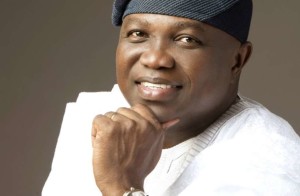 Gov. Akinwunmi Ambode of Lagos State on Thursday promised to support massive investment in modern medical equipment to meet the health challenges of residents of the state. Ambode, who was represented by the Deputy Governor, Dr Idiat Adebule, made the promise at the inauguration of Clinix Healthcare, an Ultramodern Diagnostic Centre in Amuwo Odofin, Lagos. He said that private sector participation in healthcare delivery, had complemented efforts of government and yielded tremendous dividends through qualitative healthcare. “We are delighted that the private sector partnership has yielded another state-of-the-art health facility, with the opening of this ultramodern diagnostic centre. “Medical diagnosis is the bedrock of effective treatment. With more facilities like this, we can achieve accurate and quick diagnosis of ailments and proffer immediate treatment. “As a government, one of our objectives is to curb the incessant travels abroad for diagnosis and treatment, through our Medical Park Project, that will make Lagos State a destination for medical tourism.
Gov. Akinwunmi Ambode of Lagos State on Thursday promised to support massive investment in modern medical equipment to meet the health challenges of residents of the state. Ambode, who was represented by the Deputy Governor, Dr Idiat Adebule, made the promise at the inauguration of Clinix Healthcare, an Ultramodern Diagnostic Centre in Amuwo Odofin, Lagos. He said that private sector participation in healthcare delivery, had complemented efforts of government and yielded tremendous dividends through qualitative healthcare. “We are delighted that the private sector partnership has yielded another state-of-the-art health facility, with the opening of this ultramodern diagnostic centre. “Medical diagnosis is the bedrock of effective treatment. With more facilities like this, we can achieve accurate and quick diagnosis of ailments and proffer immediate treatment. “As a government, one of our objectives is to curb the incessant travels abroad for diagnosis and treatment, through our Medical Park Project, that will make Lagos State a destination for medical tourism.
“I am reassuring the business community of our commitment to encourage investment in critical sectors, through appropriate incentives and support,’’ he said. Ambode urged residents to take their health seriously, by going for regular checks for prompt detection of ailments and treatment. Dr Modele Osunkiyesi, Permanent Secretary, Lagos State Ministry of Health, urged the centre not to compromise the quality of services. Osunkiyesi said that quality and accurate health diagnosis was the key to detecting ailments and treatment, to secure the health of the people and reduce mortality. In his remarks, Pastor Ituah Ighodalo, Chairman, Clinix Healthcare, said that the desire of the centre was to provide world class healthcare service and reduce medical tourism. Ighodalo urged government at all levels, to support and create enabling environment to encourage the private sector to complement government’s efforts.
Urgent Public Service Announcement: Product withdrawal to save the sight of our children
Written by Super User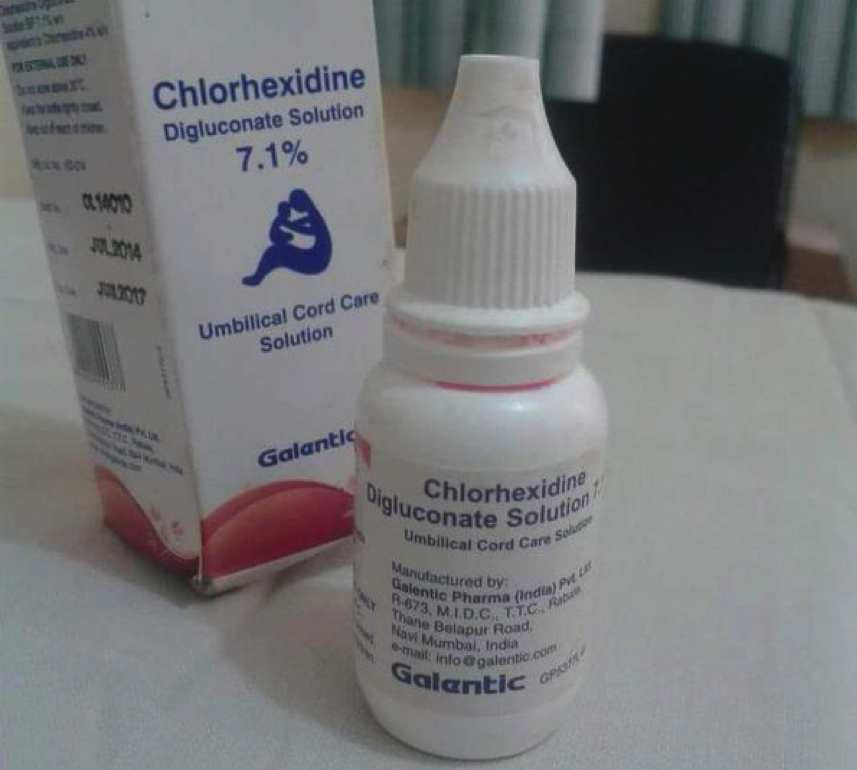
Early in September 2015, in Yobe State in Nigeria, a three-week old baby was brought to a doctor with corneal ulceration leading to immediate blindness. The doctor took a detailed history, and the only possible cause that he could find was the use of what the mother described as “eye drops”, given to her as part of a pack to support the delivery. The doctor asked the mother to go home and bring in the “eye drops”. She went home and returned with a bottle similar to the one below.
The contents of this bottle is chlorhexidine digluconate 7.1% solution packaged in a white plastic bottle apparently manufactured by Galentic Pharma (India) Pvt Ltd, as can be seen on the picture. The problem with this is that chlorhexidine digluconate 7.1% is licensed for use in Nigeria for use as an antiseptic gel to be applied to the newborn’s cord stump to prevent infection. Most people reading this will associate the container as the usual means of dispensing eye drops in Nigeria. It should never have been applied to the eyes, and therefore should never have been delivered in containers generally used for eye drops, especially when you are targeting an intervention at the poor living in mostly rural communities. It has been distributed in Yobe since March 2015.
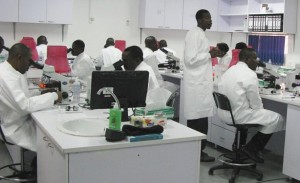 The Nigerian Medical Association (NMA) has appealed to President Muhammadu Buhari, to exempt the Medical and Dental Council of Nigeria (MDCN), the regulatory body for the medical and dental profession, from the blanket dissolution of boards and councils, as have been done for the governing councils of universities and the council for legal education. A statement by the NMA made available to LEADERSHIP in Abuja over the weekend, signed by the president, Dr Kayode Obembe and the secretary general, Dr Adewunmi Alayaki, respectively, lamented that so far, it has not been well with medical education and practice in the country. They stated that certain structures are needed to drive needed changes and the governing council of the MDCN is top on the list.
The Nigerian Medical Association (NMA) has appealed to President Muhammadu Buhari, to exempt the Medical and Dental Council of Nigeria (MDCN), the regulatory body for the medical and dental profession, from the blanket dissolution of boards and councils, as have been done for the governing councils of universities and the council for legal education. A statement by the NMA made available to LEADERSHIP in Abuja over the weekend, signed by the president, Dr Kayode Obembe and the secretary general, Dr Adewunmi Alayaki, respectively, lamented that so far, it has not been well with medical education and practice in the country. They stated that certain structures are needed to drive needed changes and the governing council of the MDCN is top on the list.
They said, “It is an established fact that President Buhari is that clean broom that would rid the Nigerian nation of all manner of impunity, corruption and other unwholesome practices. It is in sharing this vision that we make this appeal so that order would prevail and strict compliance to the Codes of Ethics achieved. We are therefore, praying Mr. President to make a proclamation exempting the MDCN from the blanket dissolution of Boards and Councils.” The statement argued that whenever there is no council, all cases before the council’s investigating panels and tribunal are suspended and new cases cannot be attended to. According to them, this has resulted in the public expressing dissatisfaction with the “council”, accusing it of protecting erring members of the profession when in actual fact there was no council in place to handle such cases.
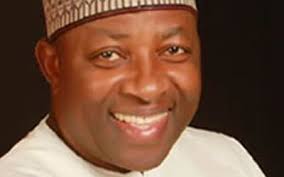 Bauchi State Government said it had spent N221.5 million on various health projects and programmes under the Primary Health Care Development Agency (PHCDA), within its 100 days in Office. Chairman, Bauchi State Primary Healthcare Development Agency, Dr Yahaya Yerima made this known on Saturday in Bauchi while fielding questions from the News Agency of Nigeria (NAN). Yerima disclosed that N160 million was paid as counterpart fund to Bill & Melinda Gates and Dangote Foundations for boosting of routine immunization in the state. He said that N9.4 million was spent on the control of 2015 cholera epidemic recorded in Bauchi, Ganjuwa, Toro, Bogoro, Shira and Tafawa Balewa Local Government Areas of the state.
Bauchi State Government said it had spent N221.5 million on various health projects and programmes under the Primary Health Care Development Agency (PHCDA), within its 100 days in Office. Chairman, Bauchi State Primary Healthcare Development Agency, Dr Yahaya Yerima made this known on Saturday in Bauchi while fielding questions from the News Agency of Nigeria (NAN). Yerima disclosed that N160 million was paid as counterpart fund to Bill & Melinda Gates and Dangote Foundations for boosting of routine immunization in the state. He said that N9.4 million was spent on the control of 2015 cholera epidemic recorded in Bauchi, Ganjuwa, Toro, Bogoro, Shira and Tafawa Balewa Local Government Areas of the state.
Yerima said that N87 million was spent on the purchase of essential drugs for distribution to various hospitals in the state. He stated that the state recorded 9,000 cases of gastroenteritis (stomach flu), as against 93,000 cases recorded in 2014. Yerima said that the drop in the figure followed the timely release of fund by the state government to control the spread of the disease. He however said that no single death was recorded as a result of the outbreak of the disease, adding that surveillance teams were currently monitoring the situation. (NAN)
More...
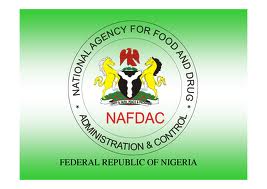 The National Agency for Food and Drug Administration and Control (NAFDAC) in Jigawa on Sunday said that it confiscated fake and unregistered drugs worth four million naira in the last two years. The NAFDAC State Coordinator, Mr Olaniran Olakunle, disclosed this in Dutse while presenting to newsmen some suspects allegedly arested with fake drugs in Gwaram and Malammadori Local Government areas. Olakunle said that most of the suspects arrested with fake and counterfeit drugs during the period were in rural communities across the state. He said that fake drugs such as mixacrip tablet, herogra, busaka, polycid and tramadol capsule were seized from some patent medicine vendors in Gwaram and Malammadori last week.
The National Agency for Food and Drug Administration and Control (NAFDAC) in Jigawa on Sunday said that it confiscated fake and unregistered drugs worth four million naira in the last two years. The NAFDAC State Coordinator, Mr Olaniran Olakunle, disclosed this in Dutse while presenting to newsmen some suspects allegedly arested with fake drugs in Gwaram and Malammadori Local Government areas. Olakunle said that most of the suspects arrested with fake and counterfeit drugs during the period were in rural communities across the state. He said that fake drugs such as mixacrip tablet, herogra, busaka, polycid and tramadol capsule were seized from some patent medicine vendors in Gwaram and Malammadori last week.
According to him, the value of drugs seized from them is about N250,000. coordinator said that the suspects were being investigated to ascertain the sources of the products in order to bring the entire chain to justice. Olakunle said that the suspects would soon be charged to court. He urged members of the public to be vigilant and patronise only registered pharmacies in their localities. (NAN)
Souurce:leadership Online
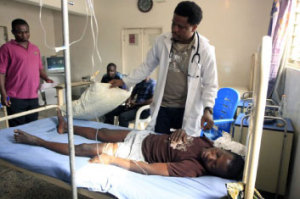 New eye popping medical technology provides earlier diagnosis, reduces cost and a breakthrough range of other benefits for both patients and health care professionals. Victor Okeke writes. Current health system technologies promise delivery of affordable healthcare to rural communities. This promise makes more meaning because rural clinics in Nigeria face a peculiar problem of the unwillingness of healthcare practitioners to work in remote communities and has negatively affected the quality of care provided in such communities. Many times the high fixed costs associated with bringing specialists in-house is cost prohibitive for smaller medical facilities. There is also the challenge of non-availability of medical equipment. Many community health centres are clinics by name with medical equipment or consumables to attend to patients’ need. Ultimately, the result is diminished patient care and lost revenue for these medical facilities.
New eye popping medical technology provides earlier diagnosis, reduces cost and a breakthrough range of other benefits for both patients and health care professionals. Victor Okeke writes. Current health system technologies promise delivery of affordable healthcare to rural communities. This promise makes more meaning because rural clinics in Nigeria face a peculiar problem of the unwillingness of healthcare practitioners to work in remote communities and has negatively affected the quality of care provided in such communities. Many times the high fixed costs associated with bringing specialists in-house is cost prohibitive for smaller medical facilities. There is also the challenge of non-availability of medical equipment. Many community health centres are clinics by name with medical equipment or consumables to attend to patients’ need. Ultimately, the result is diminished patient care and lost revenue for these medical facilities.
A technology firm, Springville Consulting in recognition of this immense developmental gap has teamed up with an international technology company Ktwo of India, to bring next- generation healthcare solutions to Nigeria. The Chief Executive Officer of the firm, Chuks Melville Chibundu said the telemedicine is not new but that this technology is a special diagnostic solution that is targeted at rural community health centres in the country. “It is a solution that imbeds diagnostic equipment and is analysed by a computer that will give you a real-time result of basic diagnostic test that a patient will normally take,” he said. For instance, the solution will analyse in real-time, malaria, typhoid, tuberculosis, do some heart test through electrocardiography (ECG), blood sugar test and all those test that we can programme within our programme. It will give you immediate results as soon as the samples are put on the chambers. He explained that the technology comes in set alongside other diagnostic equipment as it has a small ECG attached to it, microscope, the computer itself which is embedded with the necessary software to analyse all the samples that you have, a bed where the patient can lie-down on, an ECG strap and other equipment.
14yrs After Abuja Declaration, Nigeria Yet To Commit 15% Of Budget To Health
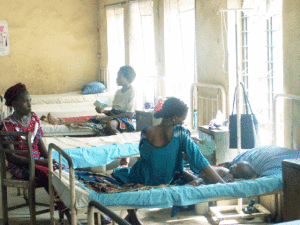 14 years after the Abuja Declaration, Nigeria is yet to fulfill its pledge of allotting 15 per cent of its annual budget to health. In April 2001 at a meeting of African leaders in Abuja, Nigeria had pledged to support the Abuja Declaration and that at least 15 per cent of the government’s annual budget will be used to improve the health sector. Last year, the country only allotted 6.3 per cent of budget to health down from 8.2 per cent the previous year. According to the United Nations Children’s Fund (UNICEF), every single day, Nigeria loses about 2,300 under-five year olds and 145 women of childbearing age which makes the country the second largest contributor to the under–five and maternal mortality rate in the world. There are many of such un-redeemed pledges in health like the Maputo Plan of Action to ensure universal access to reproductive health, the UN Every Woman Every Child- a commitment to save lives of women and children by 2015, the London Family Planning Summit- to mobilise contraceptive information, services and supplies and others. But stakeholders are optimistic that President Muhammadu Buhari will address this challenge.
14 years after the Abuja Declaration, Nigeria is yet to fulfill its pledge of allotting 15 per cent of its annual budget to health. In April 2001 at a meeting of African leaders in Abuja, Nigeria had pledged to support the Abuja Declaration and that at least 15 per cent of the government’s annual budget will be used to improve the health sector. Last year, the country only allotted 6.3 per cent of budget to health down from 8.2 per cent the previous year. According to the United Nations Children’s Fund (UNICEF), every single day, Nigeria loses about 2,300 under-five year olds and 145 women of childbearing age which makes the country the second largest contributor to the under–five and maternal mortality rate in the world. There are many of such un-redeemed pledges in health like the Maputo Plan of Action to ensure universal access to reproductive health, the UN Every Woman Every Child- a commitment to save lives of women and children by 2015, the London Family Planning Summit- to mobilise contraceptive information, services and supplies and others. But stakeholders are optimistic that President Muhammadu Buhari will address this challenge.
Speaking at an advocacy workshop yesterday, the national coordinator of Civil Society for Family Planning in Nigeria (CiSFP), Wale Adeleye said, “We now have a new government that is committed and talking about change.” He said, “We now feel that if approach this government with information about these commitment; we can really get the change that we are clamouring for.” On whether the Buhari government would redeem pledges made by the Jonathan government, he said that Jonathan made commitments in the area of security which Buhari came in and redeemed and they are towing same line.“The president himself is a father and has wife and children and I know that if he understands what the commitment are all about, I don’t see him declining to support these commitments.”
UNFPA Urges Nigeria To Withdraw Reservation On Reproductive Healthcare
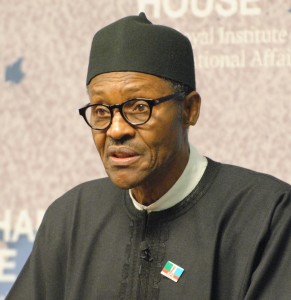 The United Nations Population Fund (UNFPA) on Friday advised the Nigerian Government to withdraw its reservation on the global reproductive health programme to enable citizens benefit from the policy. Ms Ratidzai Ndhlovu, the UNFPA Country Representative in Nigeria, gave the advice at the 2nd 2015 Population Technical Working Group (PTWG) meeting in Abuja. Represented by Mr Dasogot Dashe, the UNFPA Programme Analyst on Demography and Statistics, she advocated for the withdrawal of Nigeria’s objection to two targets of the Sustainable Development Goals (SDGs). The UN official noted that Nigeria had expressed reservation on targets 3.7 and 5.6 of the the SDGs. The News Agency of Nigeria (NAN) reports that the SDGs target 3.7 is seeking to ensure universal access to sexual and reproductive healthcare services, including family planning and reproductive health integration in all member states.
The United Nations Population Fund (UNFPA) on Friday advised the Nigerian Government to withdraw its reservation on the global reproductive health programme to enable citizens benefit from the policy. Ms Ratidzai Ndhlovu, the UNFPA Country Representative in Nigeria, gave the advice at the 2nd 2015 Population Technical Working Group (PTWG) meeting in Abuja. Represented by Mr Dasogot Dashe, the UNFPA Programme Analyst on Demography and Statistics, she advocated for the withdrawal of Nigeria’s objection to two targets of the Sustainable Development Goals (SDGs). The UN official noted that Nigeria had expressed reservation on targets 3.7 and 5.6 of the the SDGs. The News Agency of Nigeria (NAN) reports that the SDGs target 3.7 is seeking to ensure universal access to sexual and reproductive healthcare services, including family planning and reproductive health integration in all member states.
The SDGs target 5.6 is seeking to promote universal access to sexual and reproductive health and reproductive rights for citizens of the member countries. Ndhlovu therefore urged the federal government to adapt the targets as a means to delivering improved healthcare services. She explained the SDGs were adopted by UN member nations after a wide consultation to impact on the lives of citizens through a 17-goal mechanism. According to her, some of the goals include ending of poverty and hunger, improving and provision of quality healthcare and education, water and sanitation, sustainable energy and resilient infrastructure. Others were gender equality and empowerment of women and girls, safe cities and settlements, sustainable production and consumption, combating climate change, conservation of marine, oceans and sea resources, promotion of ecosystems, biodiversity and halt degradation. Besides, the envoy said that a strong partnership was being evolved to ensure that the goals were effectively implemented, monitored and evaluated. “If Nigeria withdraws her reservation on the two targets, the country will get maximum value for Naira,’’ said Ndhlovu. (NAN)
Source:Leadership Online






